April 19, 2025 | 07:17 GMT +7
April 19, 2025 | 07:17 GMT +7
Hotline: 0913.378.918
April 19, 2025 | 07:17 GMT +7
Hotline: 0913.378.918
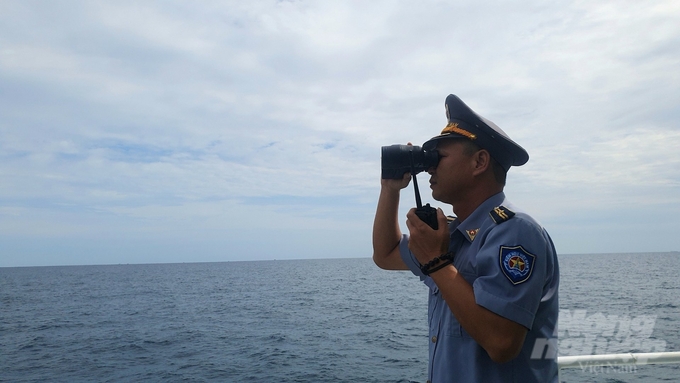
Head of Mission No. 7 (Fisheries Inspection Ship 506) Tran Nam Chung on the patrol. Photo: Kien Trung.
In October 2017, the European Commission (EC) issued a warning notice, also referred to as a "yellow card," to Vietnam in regards to its engagement in illegal fishing practices, including operations that are deemed illegal, unreported, and unregulated (IUU). This legislation has a direct impact on the export of seafood from Vietnam to this particular market. Efforts have been undertaken by the relevant authorities, particularly the Fisheries Surveillance Force, to address the issue of the IUU yellow card and its potential withdrawal.
At 1:00 a.m. on September 14, during the ship's anchorage in the Vietnam-Cambodia Historic Water Area for establishing a control post at sea, an unexpected thunderstorm occurred, accompanied by intense rainfall. All those present aboard the vessel were roused from sleep.
Subterranean waves were seen within the central region of the water body, showing a lesser magnitude compared to the first undulations, however persisting during consecutive wave formations. The southwest monsoon and thunderstorms occurring along the southwest coast are phenomena that evoke a heightened sense of fear and apprehension, beyond the intensity often associated with storms.
At midnight, Nguyen Van Duc, the captain of ship KN-506, made the decision to initiate the engine and navigate the vessel away from the anchorage in order to evade the impending storm. On the third day of the approximately three-week expedition, Task Force No. 7 continued their mission.
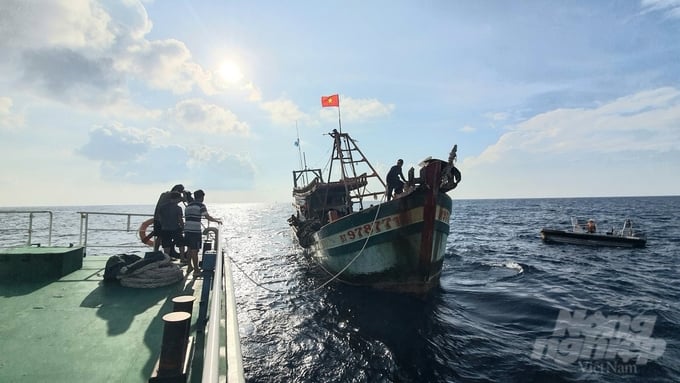
Tow fishing boat BT-97877-TS to the command ship to inspect fishing activities at sea. Photo: Kien Trung.
Mr. Tran Nam Chung, the team leader, was born in 1980 and is from My Hao, Hung Yen. He is a member of the inaugural cohort of Region V Fisheries Surveillance, which was founded in 2016.
Several months ago, he was sent to the Legal Department of the Fisheries Surveillance Department, where he exhibited a reclusive demeanor. On that particular day, he expressed his intention to go on a patrol excursion with his former team.
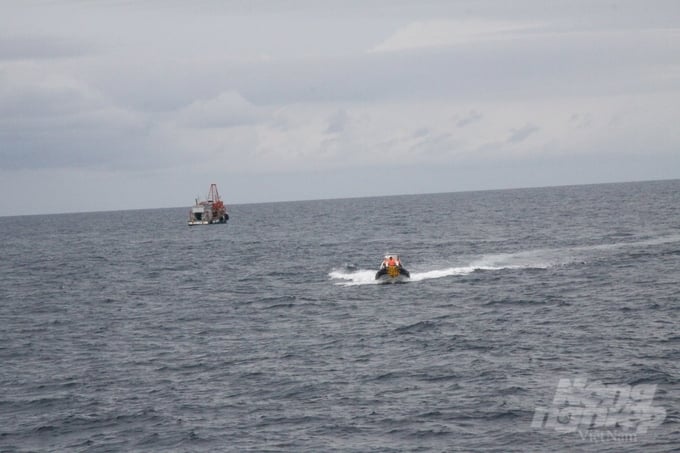
Region V fisheries surveillance approaches offshore fishing vessels. Photo: Kien Trung.
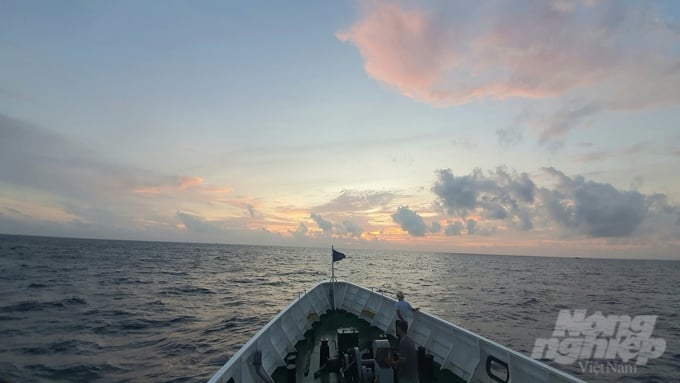
The moment of ship KN-506 at sunset on the Southwestern sea. Photo: Kien Trung.
During this time, the Region V Fisheries Supervision Department is intensifying its efforts in patrolling, monitoring, and controlling fishing activities in the Southwestern seas. This particular area is known for having the highest concentration of offshore fishing vessels in the country and is also recognized as a significant location for illegal, unreported, and unregulated (IUU) fishing infractions. Based on the proposed schedule, a total of 15 launches are anticipated to take place in the year 2023.
We are now in the fourth day. Various locations inside the An Thoi Sea region, including Ong Bat Cape, Hon Thom Island, and Canal 1, were inadvertently left in the wake of the ship. From a distant perspective, Hon Thay Boi Island appears to resemble a little pebble emerging from the surface of the water, situated in close proximity to Hon Dua Island and Tay Nam Islet. It is located in the vicinity of the Historical Water Area that borders Cambodia.
The geographical features known as Hon Vai, Hon Ong, and Point O, located in the northwestern vicinity of Tho Chu Island, manifest themselves in a progressive manner. The vessel reaches the maritime border demarcation line between Thailand and Vietnam when traveling from point O, which is in close proximity to Cambodian waters, to point K, which is in close proximity to Thai seas. During the course of the voyage, one will encounter Ca Mau Shoal, situated around 69 nautical miles away from Ca Mau Cape.
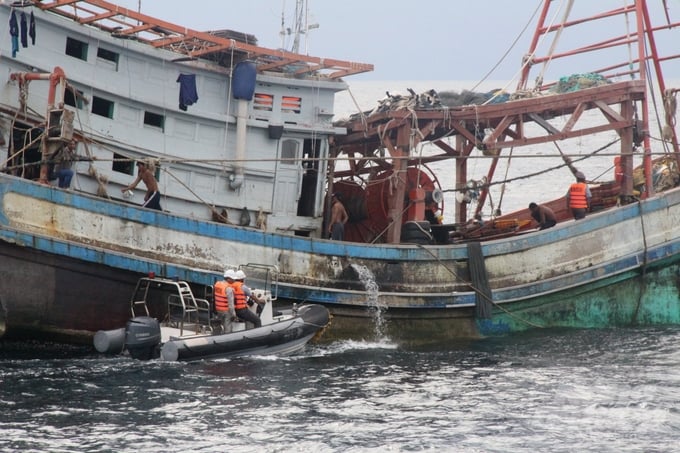
The patrol team approaches fishing vessels to check IUU compliance. Photo: Kien Trung.
Fishing boats are characterized by their constant mobility. Fishermen track fish migratory routes, seeking pathways that connect different fishing areas. The primary objective of the fisheries surveillance ship is to traverse various fishing grounds, where fishing vessels are actively engaged in their operations, to conduct inspections, enforce regulations, detect and address infractions, and remind fishing vessels to refrain from encroaching onto the territorial seas of other nations due to excessive pursuit of fish resources.
Nguyen Van Duc, the captain of the vessel KN-506, was born in 1982 in Tu Ky, Hai Duong. He has previously held a position as a lecturer at the Maritime University in Hai Phong City and has experience in operating international cargo ships. Currently, he has re-established his affiliation with the Fisheries Surveillance Unit. In the year 2017, the individual in question resumed employment at Region V Fisheries Surveillance and relocated his entire family to Phu Quoc to establish permanent residency, so designated this locale as his secondary place of domicile.
The working group consists of 15 individuals, most of whom originate from the northern regions of Hai Duong, Hung Yen, Hai Phong, Thai Binh, Thanh Hoa, Nghe An, and Quang Binh. Only two members of the group are from Kien Giang.
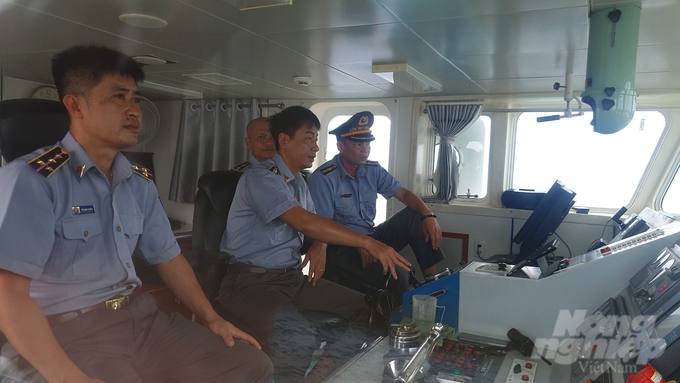
The Captain of the ship KN-506 Nguyen Van Duc (the person sitting in the middle) and his team are on duty. Photo: Kien Trung.
In the context of identifying fishing vessels and conducting fisheries surveillance, it is imperative to ensure that a safe distance is maintained between the aforementioned vessels. Subsequently, a designated working party consisting of 3-4 individuals is required to disembark from the command ship and proceed towards the fishing vessel, therefore establishing a physical separation.
The people now assigned to their respective duties communicate directly with the commanding officer in order to seek guidance and assistance. In instances when fishing vessels are found to be in violation, the team will extend an invitation to the crew to board the command ship for the purpose of document inspection, identification, and analysis of the infractions, followed by the preparation of a comprehensive record detailing the actions taken to address the violations.
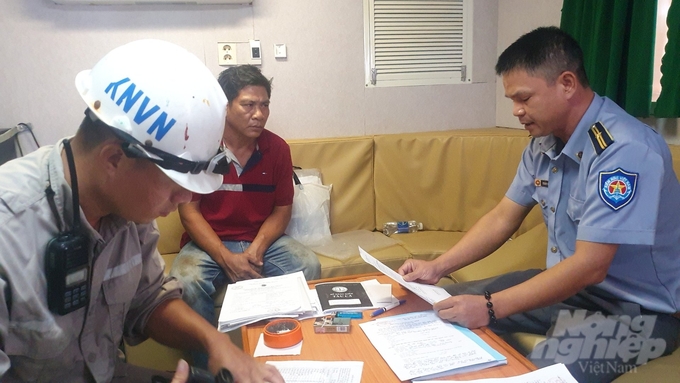
Working Group No. 7 works with the crew on the command ship. Photo: Kien Trung.
The aforementioned individuals, namely Ho Van Buon, Nguyen Van Muoi Hai, Nguyen Luan Truong, and Nguyen Van Vi, were among the pilots who were sent an invitation to serve aboard the command ship. When navigating towards a fishing vessel operated by a fisherman, the canoe adopts a circular trajectory at a considerable distance before eventually nearing the lateral aspect of the boat.
This measure is implemented to prevent any interference with the fishing nets used by the fishermen. According to Mr. Chung, it is a regulation that fisheries inspectors are prohibited from impeding the fishing operations of individuals at sea during their inspections.
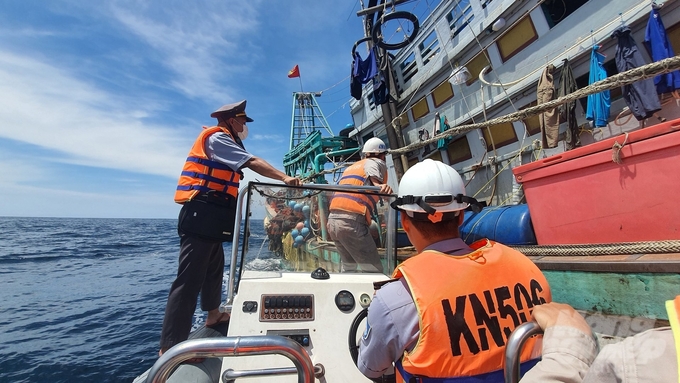
Besides inspecting and handling fishing vessels violating IUU...
There are approximately 14-15 categories of lists that necessitate verification, encompassing ship-related documents (e.g., registration, inspection, exploitation license), personal documents (e.g., ship captain's certificate, chief engineer's certificate for crew members and ship engineers), technical safety aspects of fishing vessels (e.g., insurance, safety equipment, life buoys, firefighting apparatus, cruise monitoring equipment), adherence to regulations about recording fishing logs, permissible fishing areas based on vessel size, and regulations governing the display of the national flag on the vessel.
Fishery inspectors are obligated to adhere to these requirements in their entirety, without any omissions. In addition to effectively addressing infractions, another crucial responsibility entails the declaration, dissemination, and mobilization of individuals to adhere to rules and refrain from engaging in activities that contribute to illegal, unreported, and unregulated (IUU) practices.
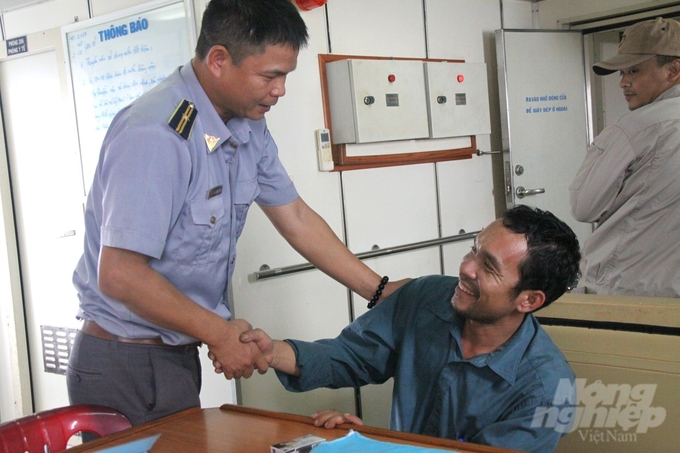
Drastically handle violations, but the Fisheries Surveillance force must also be a fulcrum for fishermen to have confidence offshore. Photo: Kien Trung.
As to Mr. Chung's statement, instances of illegal, unreported, and unregulated (IUU) activities frequently transpire inside regions where the maritime boundaries between Vietnam and Indonesia, Malaysia, Thailand, and Cambodia remain undefined. In the context of maritime history, instances frequently arise wherein fishing vessels are apprehended for surpassing their designated fishing boundaries, subsequently subjected to ransom demands, and have their harvested goods confiscated. Additionally, there are additional complications that emerge, such as instances where laborers aboard offshore fishing vessels receive monetary advances from the vessel's proprietor, but upon reaching the open sea, they abscond and fail to fulfill the terms of their contract.
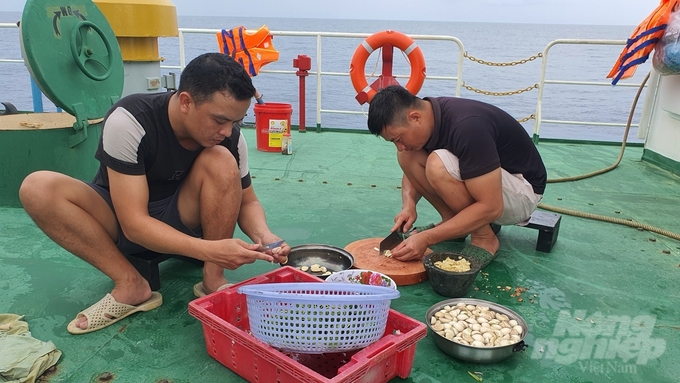
The fishermen of the KN-506 ship become "foster brothers" after every day of hard work. Photo: Kien Trung.
The responsibility of removing IUU yellow cards in the Southwestern seas falls upon fisheries monitors, who are tasked with this important duty. It is an important task that requires their full engagement and dedication.
Translated by Linh Linh
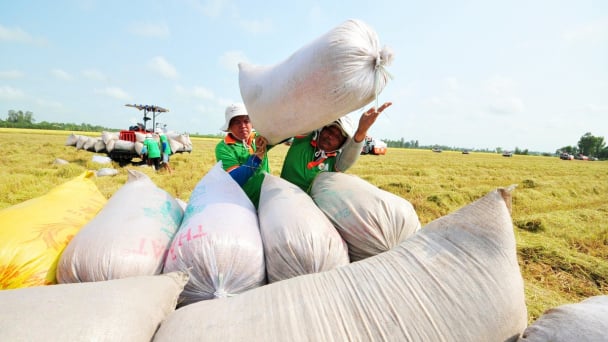
(VAN) The rice industry in the Mekong Delta is undergoing a major transformation, shifting toward sustainable, high-quality, and low-emission exports to meet the green and clean standards increasingly demanded by international markets.
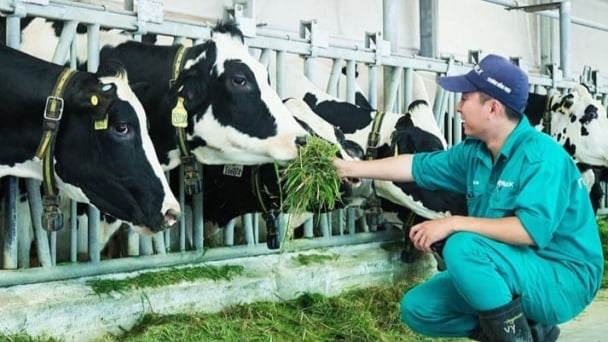
(VAN) According to Tong Xuan Chinh, Deputy Director of the Department of Livestock Production and Animal Health, Vietnam’s dairy cattle industry must overcome seven major challenges to achieve sustainable development.
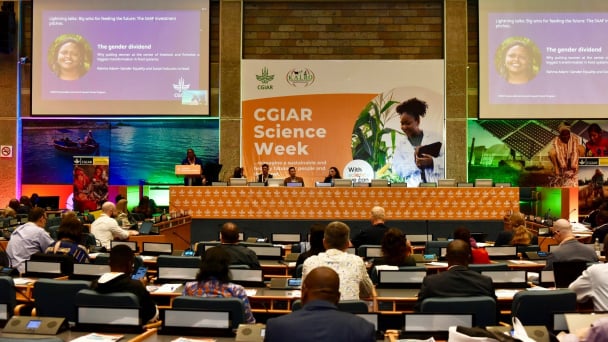
(VAN) The CGIAR’s Sustainable Animal and Aquatic Foods (SAAF) program represents a new approach that emphasizes the transformation of food systems toward sustainability.
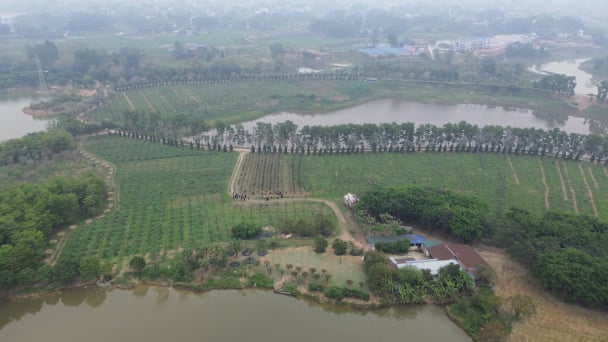
(VAN) Scientists assume that industrial agriculture has been 'outdated.' As a result, a comprehensive overhaul or a revolution in the direction of embracing ecological agriculture is needed.
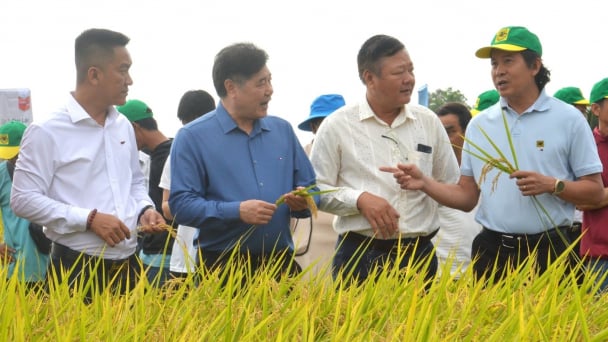
(VAN) The results from pilot fields are catalyzing the expansion of the One million hectares of high-quality, low-emission rice project in Kien Giang.
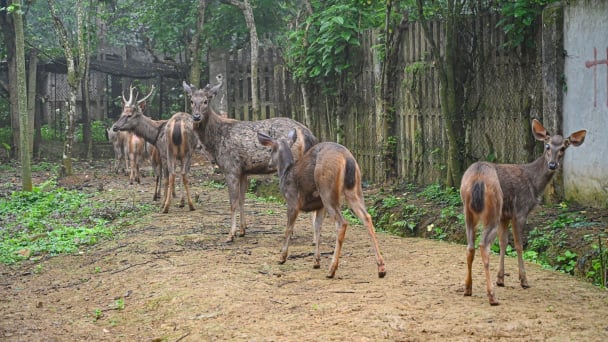
(VAN) On the morning of April 11, Cuc Phuong National Park received 18 individuals of endangered and rare wild animals from Da Nang city.
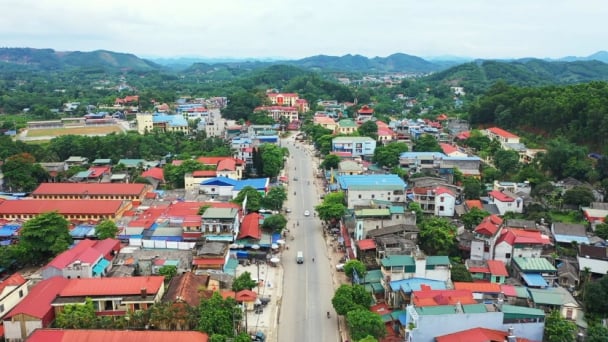
(VAN) FAO supports Vietnam in enhancing survey sampling techniques for the 2025 nationwide agricultural and rural census.